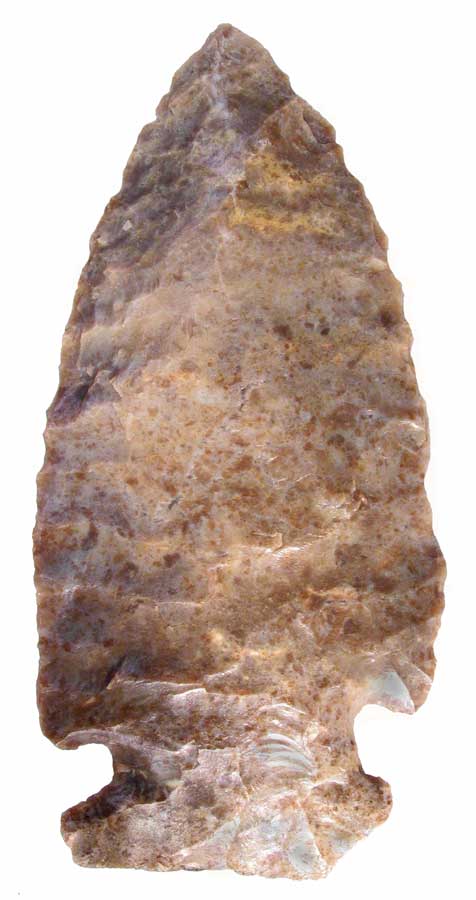

Point Type: JACK'S
REEF CORNER NOTCHED
Also See: Afton, Brewerton Corner Notched,
Elliston, Kiski, Lycoming Co., Oley, Palmer
, Raccoon Notched, Vosberg
Location: Eastern United States
Associated Dates:
1500 - 1000 B.P.- Woodland to Late Woodland
Morphology: Corner Notched
General Description: The Jack's Reef
Corner Notched point is a broad, thin corner notched point of medium size that
frequently has angular blade
edges. The shape is often ovoid or
pentagonal in outline and flat or nearly so in cross section. Within this range of
variation, the blades of some specimens exhibit an obtuse angle along each
edge. This obtuse angle can be distinct and sharp with straight edges
converging from the tip and the shoulder or it can be an indistinct joining of
two excurvate edges between the tip and the shoulder. The blade edges vary
from relatively straight to excurvate.
The stem is corner notched and
basally flaring. The barbs are small to
large, thin and sharp. The base is
straight and occasionally slightly smoothed
.
The proportions of the typical Jack's Reef Corner Notched point are one and
one-fourth times as long as wide. The length ranges from about 25 mm to 58
mm with the average being about 44 mm to 51 mm. The maximum
thickness is 4.7 mm to 6.34 mm.
Materials used in
manufacture are
eastern Pennsylvania jasper, New York Onondaga flint, and Flint Ridge, Ohio
Chalcedony. The points appear to have been extremely well made by
carefully controlled percussion flaking followed by precise pressure
flaking techniques. The barbs are always thin and delicate and prone to
breakage. Pressure retouch was used to sharpen and align the blade
edges.
The Jack's Reef Corner Notched point type is a late to
Middle Woodland point. It appears to be one of the forms found in the
Intrusive Mound culture graves at the Mound City Hopewell group in Ross County,
Ohio.
Justice
postulates that the Jack's Reef Corner Notched point probably
represents one of the first true arrowheads used in the Eastern United
States. They were superseded by the Levanna triangular type.
The Jack's Reef Corner
Notched has a very wide range
and is found in New England, New York, New Jersey, Delaware, Pennsylvania, Ohio, Indiana,
Michigan, Wisconsin, Ontario - Canada, West Virginia, Kentucky and northern Virginia, northern
Alabama, South Carolina and Tennessee.
The Jack's Reef Corner
Notched point was named by William A. Ritchie in 1961 from specimens he found
at the late Point Peninsula Jack's Reef site in Onondaga County, NY in 1947.
About the Point Above: The point pictured above is an exceptionally large sized specimen of the Jack's Reef Corner notched point type. This specimen is made from a light tan and brown colored flint that has a satin sheen. This point is more of the ovoid type vs. the pentagonal outline style. The point measures 62 mm in length, 30 mm at the widest point (across the shoulders) and is 6.2 mm thick mid blade at the shoulders with the majority of the blade only being 5.7 mm thick. The barbs are 1.6 mm thick! The blade cross section is flat with bifacial beveling and much meticulous surface pressure flaking. The blade edges are still quite sharp. The hafting area thins down to 4 mm in thickness and is 24 mm wide. The base is flat and is slightly ground and the stem is 13 mm in length. The right basal ear is broken from historic times and the right notch is expanded in width. This point was a surface find from Iron County, Wisconsin. Catalog Number 179-17-Y
References: Dragoo (6), Fogleman, Hranicky, Justice (1), Overstreet, Perino (1) (3), Powell, Puckett, Ritchie, Waldorf
© Copyright 1997 - 2009 LITHICS-Net WWW.LITHICSNET.COM
Use Your Browser's BACK Button to Return to the LITHICS-Net Index.